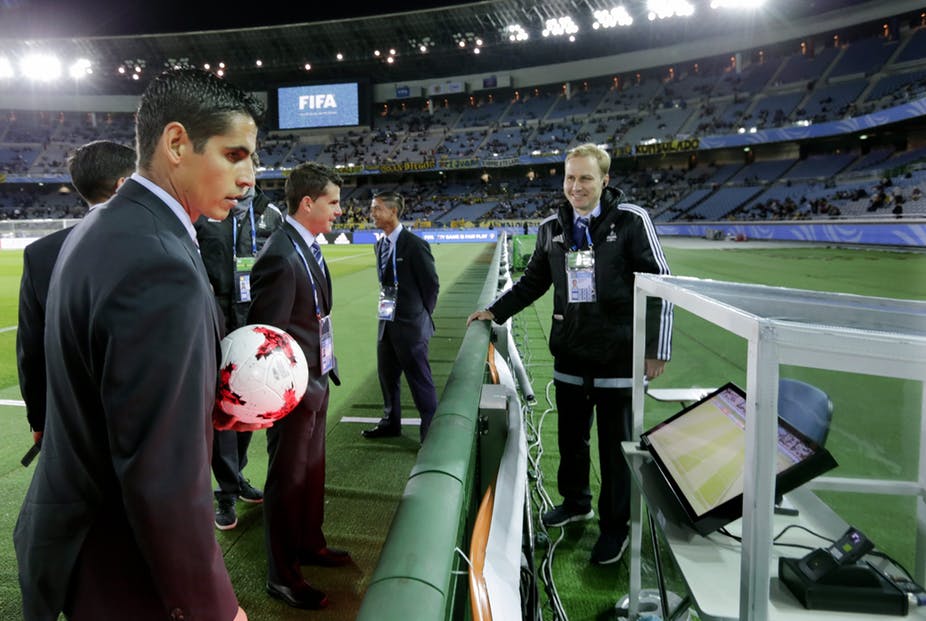Video-assistant referees (VAR) were introduced into the FIFA World Cup for the first time this year.
For those who haven’t been paying attention: VAR are a team of off-field officials who can replay and review video of on-field refereeing decisions – particularly those involving goals, goalscoring opportunities, and penalties.
This sounds like it would be a good thing – but the technology has resulted in some controversial and heavily debated decisions at the World Cup in Russia.
For example, the foul that afforded France’s Antoine Griezmann a penalty to help seal the win against Australia in the first round of matches was initially overlooked by the ref. He was subsequently persuaded by advice from the VAR to review the video and award a penalty.
Antoine Griezmann’s goal during France v Australia.
Conversely, Switzerland’s equalising goal against Brazil – which propelled them into the round of 16 – might have been disallowed because a Swiss player had held a Brazilian player back illegally. But the VAR made no argument to review the goal.
Steven Zuber’s equalising goal during Brazil v Switzerland.
Given the controversies generated by these decisions, one might question whether the introduction of VAR really improves the quality of refereeing. In fact, instead of improving the decision-making of on-field refs, VAR may actually undermine it.
The nature of expertise
Becoming an expert at anything takes dedicated practice. One of the things experts excel at is the ability to perceive vital information in the surrounding environment, relate that to an extensive knowledge base built up through years of practice, and then translate this information into an appropriate response.
A referee who witnesses foul play will relate its type and gravity to the appropriate penalty set out in the rules of football, then decide whether to award a free kick and possibly a yellow card. This is commonly referred to as perceptual-cognitive expertise.
But it isn’t this alone that sets an expert referee apart from everyone else. Referees not only have to make the right decision, they have to do it while taking into account the context of the decision – and all in the blink of an eye.
Intuitive versus rational decision-making
We are taught never to judge a book by its cover and to think carefully about decisions, but also to trust our intuition. Yet these instructions seem to contradict each other. They highlight the fact that there are two systems of decision-making: the fast, intuitive system, and the slow, rational, analytical system.
The rational system involves basing decisions on careful deliberation of relevant information, and the potential costs and benefits of a decision. Intuitive decision-making is far less conscious and deliberate, and is often more affected by emotion and gut feeling.
For example, a study on decision-making in firefighters found that firefighters don’t think, they just act based on their experience in previous situations. This highlights the intuitive nature of decision-making under pressure and the role played by experience.
For football referees, there is no time for slow and rational decision-making either, due to the inherent pressures of the game. When making difficult decisions in challenging circumstances, referees must largely rely on fast and intuitive decision-making that is a product of extensive practice and experience. Because of this, problems with objectivity (referees are inherently and unconsciously biased) and accuracy (referees make some errors each game) are well recognised and accepted as an integral part of football.
VAR could undermine intuitive decision-making
The expert referees at the FIFA World Cup have spent years developing intuitive decision-making processes that allow them to make objective on-field calls. Despite considerable external pressure from fans, players and coaches, these decisions are correct most of the time.
For example, one study found that 73.8% of offside calls during the Fifa 2002 World Cup were assessed correctly. Referees in the English Premier League during the 2013-14 season were correct 95% of the time.
This is because referees have become experts at matching perceptual and contextual information from the game with knowledge about the rules, through years of extensive practice.
Providing referees with VAR could interfere with this intuitive process.
Every refereeing decision brings a cost and a benefit to the game. The discrepancy between the VAR and the on-field referees could affect a referee’s authority and subsequent decisions during the games. The addition of the VAR likely moves the decision-making process of expert referees from a highly effective intuitive process to a more rational or analytical one.
Given the limited experience of using VAR to date, and its potential interference with current on-field referees’ expertise, it is questionable whether VAR truly adds value to on-field referees’ performance. Perhaps it limits their ability to make intuitive decisions that reflect the fast-paced nature of the game, ultimately compromising the expertise they have worked so hard to acquire.
If the use of VAR continues, young referees should be trained to make decisions in the presence of VAR during the developmental process, and its implementation with more expert on-field referees should be thoroughly reviewed.



 Trump Attends Super Bowl Amid Cheers, Boos, and Political Divide
Trump Attends Super Bowl Amid Cheers, Boos, and Political Divide  From Messi to Mika Häkkinen: how top athletes can slow down time
From Messi to Mika Häkkinen: how top athletes can slow down time  Trump Plans UFC Event at White House for America’s 250th Anniversary
Trump Plans UFC Event at White House for America’s 250th Anniversary  What makes a good football coach? The reality behind the myths
What makes a good football coach? The reality behind the myths  Native American Groups Slam Trump’s Call to Restore Redskins Name
Native American Groups Slam Trump’s Call to Restore Redskins Name  Trump Draws Cheers at Ryder Cup as U.S. Trails Europe After Opening Day
Trump Draws Cheers at Ryder Cup as U.S. Trails Europe After Opening Day  Trump's Transgender Sports Ban Faces Enforcement Challenges
Trump's Transgender Sports Ban Faces Enforcement Challenges  LA28 Confirms Olympic Athletes Exempt from Trump’s Travel Ban
LA28 Confirms Olympic Athletes Exempt from Trump’s Travel Ban  U.S. Plans $115 Million Counter-Drone Investment to Secure FIFA World Cup and Major National Events
U.S. Plans $115 Million Counter-Drone Investment to Secure FIFA World Cup and Major National Events  ‘The geezer game’ – a nearly 50-year-old pickup basketball game – reveals its secrets to longevity
‘The geezer game’ – a nearly 50-year-old pickup basketball game – reveals its secrets to longevity  Trump Set to Announce Washington D.C. as Host of 2027 NFL Draft
Trump Set to Announce Washington D.C. as Host of 2027 NFL Draft  Extreme heat, flooding, wildfires – Colorado’s formerly incarcerated people on the hazards they faced behind bars
Extreme heat, flooding, wildfires – Colorado’s formerly incarcerated people on the hazards they faced behind bars  Trump Threatens Stadium Deal Over Washington Commanders Name
Trump Threatens Stadium Deal Over Washington Commanders Name  Los Angeles Mayor Says White House Must Reassure Fans Ahead of FIFA World Cup
Los Angeles Mayor Says White House Must Reassure Fans Ahead of FIFA World Cup  US Reviewing Visa Denial for Venezuelan Little League Team Barred from World Series
US Reviewing Visa Denial for Venezuelan Little League Team Barred from World Series  Apple Eyes U.S. Formula 1 Broadcast Rights in Major Sports Streaming Push
Apple Eyes U.S. Formula 1 Broadcast Rights in Major Sports Streaming Push 



























